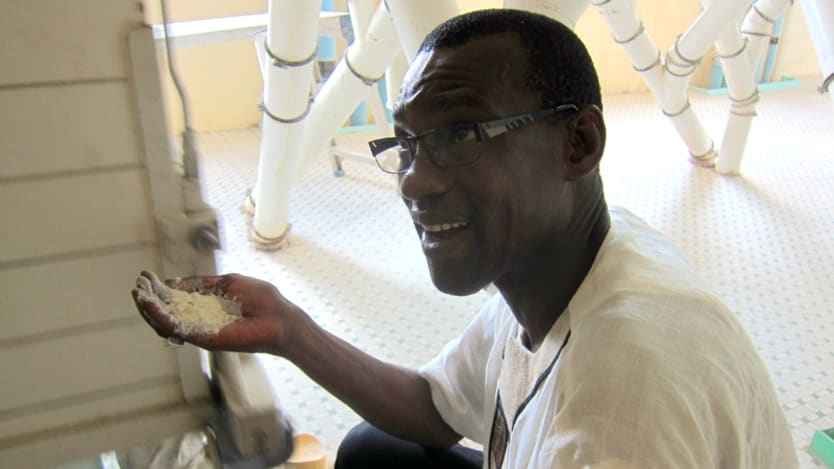
This week in New York, the United Nations will adopt sustainable development goals for ending hunger, achieving food security and improving nutrition for all of humanity. Earlier this month, Helen Keller International was a co-sponsor of the Global Food Fortification Summit in Arusha, Tanzania, which aimed to reinvigorate interest, awareness and investment in a critical, cost-effective but often overlooked pillar of this global effort: food fortification.
As outlined in the Arusha Statement, at least 3 million child deaths are attributable to critical vitamin and mineral deficiencies each year, and at least 2 billion people are affected by micronutrient malnutrition. When people are undernourished, their productivity declines. The economic impact of malnutrition is estimated to be as high as a 2-3 percent loss in gross domestic product.
Food fortification — the addition of essential vitamins and minerals to food staples — has historically been an important tool in the fight against malnutrition. In the United States, we often take for granted that the micronutrient profile of our diets has long had a backstop through the fortification of staples like bread, pasta and even water. Yet in recent decades, the spread of food fortification has meant improved lives for hundreds of millions of people worldwide, a significant gain in the global fight against malnutrition.
At Helen Keller International, we know the potential of food fortification firsthand. In our work together with government and private sector partners, we’ve reached more than 290 million people in 19 countries across Africa, fortifying cooking oil with vitamin A and wheat flour with iron and folic acid. By providing these micronutrients to the world’s most vulnerable, we’ve seen vast improvements in the quality of people’s diets, which can directly impact reductions in maternal and child mortality, as well as the virtual disappearance of vitamin A-related blindness.
But the job is not done. To meet the ambitious goals to improve nutrition laid out by the SDGs, it is imperative that as a global community, we continue to expand access to and monitor implementation of this important advancement in public health.
In the coming weeks, many countries will form task forces to operationalize their SDG commitments. We believe that in addressing the second SDG — ending hunger, achieving food security and improving nutrition — countries can and should turn to food fortification as a priority, proven and cost-effective nutrition solution. HKI stands ready to assist any country and global civil society in this important effort.
To be clear, our goal at HKI is to provide developing nations with the tools they need to effectively end malnutrition in their communities. If we can build and reinforce effective food fortification programs with the help of local and regional stakeholders, countries can reduce their dependence on international assistance and be fully empowered to successfully take full ownership in their own fight against malnutrition.
As a global civil society, we must celebrate the critical progress achieved in West Africa, where 14 out of 16 countries have adopted national laws that mandate food fortification. This success serves as a catalyst to support fortification legislation and effective programs in more countries throughout Africa and Asia to bring the benefits of improved diets to many more women and young children.
HKI achieves success in fortification through partnerships, and working hand-in-hand, with governments, the private sector and civil society. We believe this type of partnership can serve as a model in effectively expanding and monitoring food fortification standards.
Food fortification must not be subject to political winds and should be made part of national nutrition plans both in national and regional contexts. Too often regulations around complex efforts like these are incompatible across country lines — resulting in a literal watering down of standards. Clear regional standards for food fortification mean that progress in one country cannot be undercut by food imports that lack sufficient fortification from another.
Furthermore, public health officials, advocates and NGOs must also partner with local food industries. By strengthening ties with the producers and distributors of food staples, public health entities can help ensure that their products contain the correct nutrients — at the correct levels — to benefit their consumers.
And to ensure the food industry is correctly enacting improved standards, local and regional governments must play a strong regulatory role. Nongovernmental entities can assist in monitoring as well. At HKI, we have trained the staff of more than 180 wheat flour millers and vegetable oil producers in 19 countries in quality assessment and control, as well as government regulatory, food inspection and customs enforcement agencies.
This is a joint call to action. By partnering with local actors, the international community can lay the groundwork for all nations to effectively offset the devastating effects of malnutrition. We need civil society’s involvement to create strong food fortification alliances through an ongoing cycle of advocacy, education and monitoring across sectors.
The effects of these efforts cannot be overstated. If we are successful as a global community in furthering food fortification, we will reduce child and maternal mortality, giving children and mothers the nutrients they need every day in an accessible, affordable way.
We will help end many developing nations’ dependence on the international community in the fight against malnutrition. We will make adverse health effects from vitamin deficiency, like blindness from vitamin A deficiency, a thing of the past, and in the process fueling a virtuous circle with proper nutrition leading to increased educational, social, and developmental outcomes.
Future Fortified is a special online series exploring the impact and importance of food fortification to meet global development objectives. Join Devex — and our partner GAIN — in the conversation using #FutureFortified.
